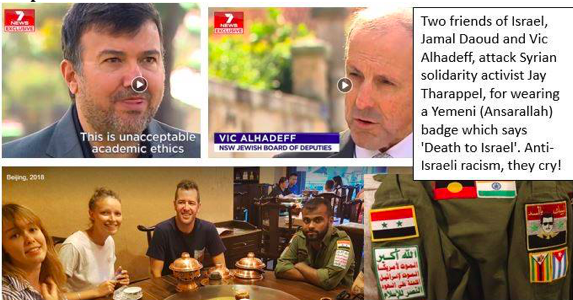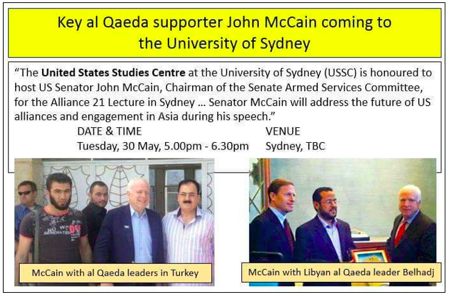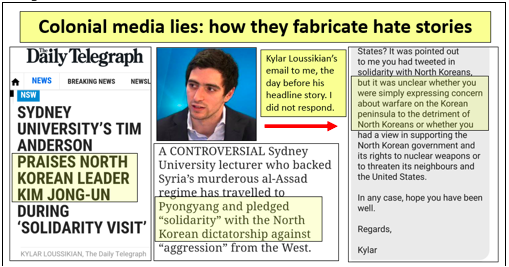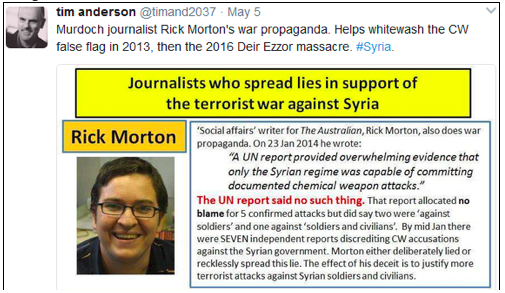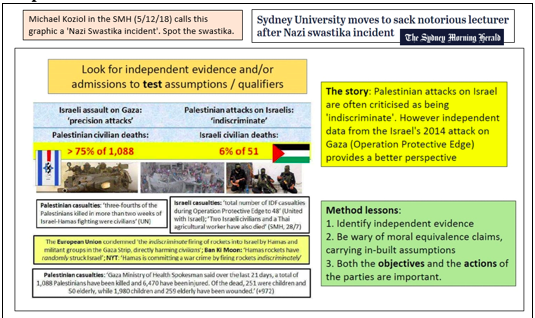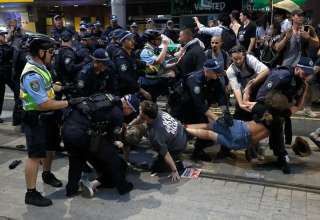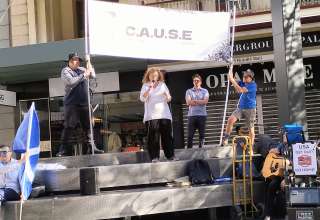Provost Stephen Garton’s Overreach
by Prof Tim Anderson
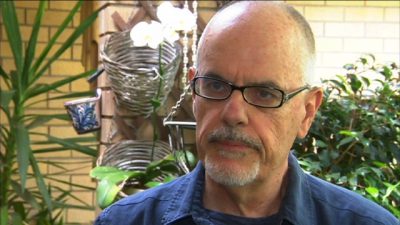 By trying to expel me over anti-war statements, University of Sydney Provost Stephen Garton has widened the free speech debate and deepened on campus fears. Since the main criterion for his attack on me was public comments considered ‘offensive’, more students and staff are likely to hesitate before raising their voices on any controversial topic.
By trying to expel me over anti-war statements, University of Sydney Provost Stephen Garton has widened the free speech debate and deepened on campus fears. Since the main criterion for his attack on me was public comments considered ‘offensive’, more students and staff are likely to hesitate before raising their voices on any controversial topic.
On 4 December Stephen Garton suspended me from my position as a senior lecturer and banned me from entering the university I have worked at for more than 20 years. The complaints were over a series of public statements which he saw as ‘offensive’ to Israel, to university managers and to pro-war journalists.
A Review Committee (and possibly a Fair Work Tribunal) will examine his decisions, considering two important and inter-related matters: should ‘offensive’ statements, including criticisms of the state of Israel, be subject to sanction?
This article explains some detail of the vilification and censorship campaigns run against me over 2017-2018. It supplements my academic writings in this area, including my 2010 paper on the US Studies Centre (‘Hegemony, Big Money and Academic Independence’. Australian Universities’ Review, 52:2), several recent chapters and articles on the colonial media and war propaganda and a forthcoming journal article titled ‘War and the Corporate University’.
I have written of my motivations and anti-war track record in a recent essay titled ‘War, abuse and other peoples’ (see this), while many others including Ali Kazak (see this) and Michael Brull (see this) have tried to explain why there is such a poor level of public debate over Palestine in Australia. In my long essay ‘The Future of Palestine’ (see this) I emphasis both the distinctions and the parallels between the European crimes against the Jewish people and the crimes of the Jewish colony in Palestine against the Palestinian people.
Both the ‘offensive’ criterion for university sanctions and the attempt to ban criticisms of the state of Israel have been rejected by more than 60 of my University of Sydney colleagues. Their joint letter states:
“Academic freedom is meaningless if it is suspended when its exercise is deemed offensive … There can be no better-known or more banal occurrence in intellectual history than the suppression of ideas on the grounds of their offensiveness to powerful interests. In instilling a fear of arbitrary reprisal, this suppression stifles the very freedom of debate and of thought that education requires … [further] we insist that the drawing of historical comparisons between the actions of states is essential to intellectual and educational work, and must not be subject to a priori constraints”
While deepening the free speech debate, Stephen Garton has also linked Australia’s oldest university with the zionist demand to equate criticism of the state of Israel with anti-Jewish racism. I say this is an extreme and unjustifiable stance, for which Provost Garton has no mandate and which our university cannot support.
Let me illustrate the point. One of my photo posts subject to management criticism, of friends at lunch in Beijing (bottom left in Graphic 1), showed a friend wearing a jacket which had several badges. One of those was from Yemen, with an Arabic text which said, amongst other things: ‘Death to Israel’.
University managers then plagiarised a bad translation given to them by Channel Seven television (“Death to the Israeli”) and accused me of ‘endorsing or promoting racial hatred’.
Even though I had neither worn nor endorsed the badge, nor did it have any relevance to my post of friends at lunch, I pointed out the difference between state and people to the arbiter, Stephen Garton. His response showed that, while he rejected (with some ambiguity) the ‘racial hatred’ claim, he did not recognise the difference between states and peoples.
“I am not satisfied that … the image posted … endorses or promotes racial hatred … [however] I am satisfied that the content is offensive or derogatory … whether the meaning of the Arabic text on the patch … is ‘death to Israel’ … or ‘death to the Israeli’, when it is coupled with ‘Curse the Jews’ it is an incitement for the death of the predominantly Jewish inhabitants of the state of Israel and not a purely political statement seeking the demise of a nation state as you have suggested.” (SG, 19 October 2018)
The lobbying for this attack came from Channel Seven (linked to the Caterpillar group, which provides the machines for and makes money from Palestinian home demolitions), Vic Alhadeff, a supporter of Israel, and Jamal Daoud a local Jordanian-Australian.
Jamal Daoud is a disturbed man who, although he claims to back Syria, has attacked more than 25 prominent supporters of Syria, calling us ‘spies, prostitutes and terrorists’, without a shred of evidence. He falsely claims to be a doctor and a community leader, is banned from Lebanon on security grounds and is wanted for questioning in Damascus over taking Israeli propagandist Jonathan Spyer to Syria. That is why his ‘peace tours’ to Syria came to an end.
Stephen Garton’s attempts to sanction or censor comments considered ‘offensive’ runs through several months of private letters. I told him last year that I made my criticisms (mostly of journalists engaged in war propaganda) based on my statements being ‘factual, in the public interest and with no abuse’ (FPINA). That formulation, I argued, was consistent with the academic freedom provisions of the university’s enterprise agreement (currently EA s.315), which protects the right of academic staff to express ‘controversial views’, so long as they do not ‘engage in harassment, vilification and intimidation’.
However he did not accept my position and has rather ‘lowered the bar’ of criteria for sanction or censorship. Without any reference to the university Enterprise Agreement Provost Garton told me:
“Although you have established your own set of criteria for public criticism … this does not remove or override the fact that you owe obligations to the university as one of its employees”. He went to censure me for statements said to be “intemperate … not fair and reasonable … not appropriate … derogatory … [and/or] offensive” (SG, 2 August 2017).
Garton reinforced the difference in criteria by finding ‘misconduct’ over a private letter I had written to Arts Dean Annmarie Jagose, in which I criticised her for leaking information to the tabloid media. That leak resulted in the front page smear of a university tutor (see Graphic 2).
The Daily Telegraph story was an entirely fictitious claim that the tutor had made a ‘genocide threat’. The story would not have been possible without the leak of a supposedly confidential investigation. Garton however defended Dean Jagose from my criticism: “you set out your view that the assertions … were ‘factual, relevant to the matter, based on genuine belief and not abusive’”. This was a correct summary. In my view the Dean deserved criticism for contributing to this smear of a junior colleague.
However the Provost found that my private letter was “derogatory in nature, unprofessional and failed to meet the university’s expectation that you treat other staff with respect, impartiality, courtesy and sensitivity” (SG, 2 August 2017). That is certainly a disincentive for anyone thinking to make private, non-abusive criticism of a university manager.
In May 2017 I criticised the invitation to my university of (the late) Senator John McCain, a US politician who openly supported vicious al Qaeda leaders in Libya and Syria. Graphic 2 below shows my main tagline ‘al Qaeda supporter’, with relevant photos. In comments I also referred to him as a ‘war criminal’.
Provost Garton made these statements matters of ‘misconduct’, for these reasons: “there are no grounds to assert that Senator McCain is a ‘war criminal’ … [that] suggests that there has been a verdict by a court or tribunal … [your statement] is not fair and reasonable and is not professional or exercise [sic] professional restraint” (SG, 2 August 2017). Wrong. Unprosecuted war criminals can be called out, when there is evidence. Garton’s reasoning suggests, for example, that Adolf Hitler could not be accused of war crimes. Just absurd.
In early 2017, after a flurry of tabloid media attacks on an academic conference on Syria a group of us held at the university, managers showed great concern at the sensitivities of journalists who – after smearing the anti-war campaigners – complained that they themselves had become the subjects of criticism in social media. Several of the ‘misconduct’ charges subsequently thrown at me were over my (non-abusive) responses to either false war stories or dishonest criticism in the media smears run against me.
One example of a dishonest smear can be seen in Graphic 4. Murdoch journalist Kylar Loussikian, who had previously run an abusive story on me (for debunking the baseless chemical weapons claims against Syria) decided to lie about my supposed ‘praise’ for the North Korean leader, simply because I had visited that country and had spoken of solidarity with the Korean people. I have always made it clear that solidarity is always with people, not governments. Yet as Kylar’s ‘night before the story’ email to me shows, he had no evidence I had said anything at all about the north Korean leadership. What does that matter?
Yet Kylar Loussikian and his Murdoch media colleague Rick Morton complained to the university of my social media counter-criticisms (see Graphic 5). When they got the university to intercede on their behalf, I was accused of ‘misconduct’. I told Garton I criticised Rick Morton for making ‘a series of false statements about the war, from 2014 onwards’. In particular, Morton reported in January 2014 that a United Nations body had found Syrian Army had used chemical weapons. That was quite false. My criticism was harsh but factual.
The Provost was unmoved, accusing me of ‘misconduct’ for using “intemperate” language which “constituted personal attacks on Mr Loussikian and Mr Morton” (SG, 2 August 2017). But there was nothing gratuitous in this criticism. Stephen Garton did not recognise the difference between personal criticism and personal attack.
At times Stephen Garton has said that my anti-war commentary did not meet his ‘behavioural expectations’. Well the reverse is also the case. I did not expect that university managers would defend me against the various personal attacks from the gutter press. That would have required some courage. I was not surprised when they did not celebrate my academic achievements. The controversial nature of much of my work often makes managers ‘look the other way’. No manager said to me ‘congratulations on having your book The Dirty War on Syria published in ten languages, and for it being cited in the UN Security Council!’ Nor did the head of School (my nominal supervisor) say, in 2018: ‘congratulations on your extremely high level of research publications!’ No matter.
However I did expect that university managers would not abuse me and my colleagues by leaking information to the tabloid media, to assist with smear stories. That I regard that as a breach of trust and reprehensible.
Stephen Garton’s final ‘misconduct’ claim – the one that led him to make a finding of ‘serious misconduct’ – was billed as a ‘Nazi swastika incident’ by Michael Koziol, in the Sydney Morning Herald. Indeed, except for the fact that the SMH did not show the actual graphic (Graphic 6), this could be seen as one logical extension of Garton’s flawed reasoning.
Provost Garton said that my post contained “the altered image of the Israeli flag … [with] a cropped swastika … the inclusion of the altered image of the Israeli flag in your Twitter posts, Facebook posts and teaching materials is disrespectful and offensive, and contrary to the university’s expectations and requirements” (SG, 3 December 2018).
Of course, if one looks at the actual graphic, it has virtually nothing to do with a swastika. It is possible that, with extreme magnification, one can make out some buried symbols in the background graphic. However the plain meaning of the graphic is not hidden. It is about the use of independent evidence when considering casualties during an Israeli assault on Gaza.
It is not that I am shying away from a comparison between Nazi Germany and Apartheid Israel. In the right circumstances that is legitimate, and in fact I do so, in some respects, in my essay ‘The Future of Palestine’ (see this). Studies in comparative fascism are entirely legitimate exercises. But the simple fact is that this Info-Graphic (Graphic 6) is about something far more specific and distinct.
Indeed to pretend that this graphic is about a swastika is a slap in the face to the Palestinian people. It says that their lives and their resistance do not really matter. All that matters is the microscopic ‘alteration’ of a colonial flag. Anyone with respect for indigenous peoples would acknowledge the real substance of this graphic. Stephen Garton failed to do that.

